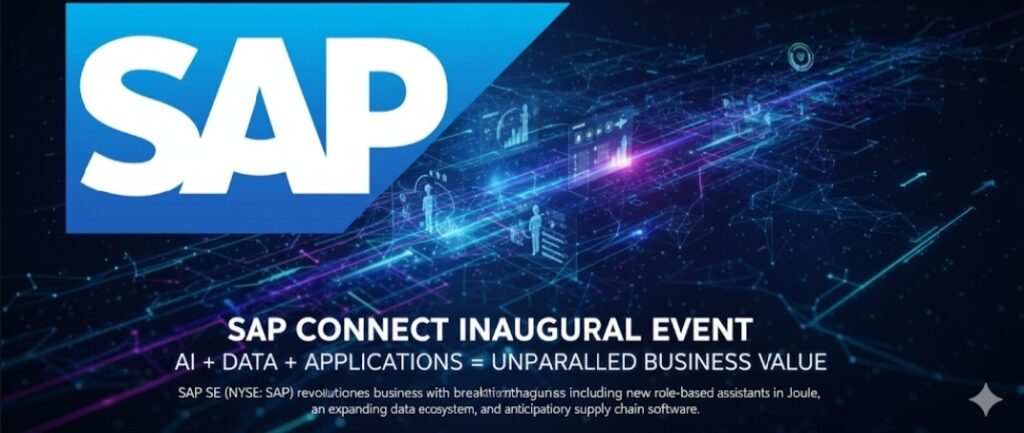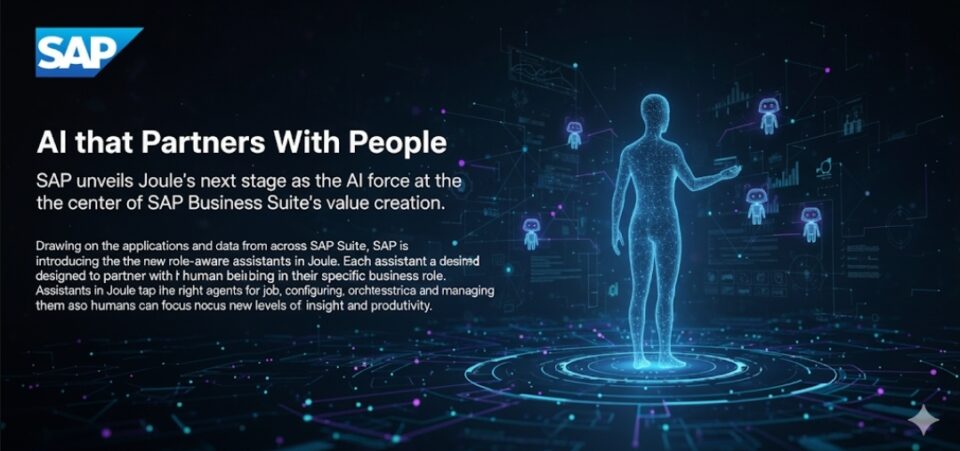The Human-AI Partnership Era with Joule Platform: How Role-Based AI Assistants Are Transforming Enterprise Operations
Have you ever wondered why some companies seem to effortlessly scale their operations while others struggle with basic workflows? The answer increasingly lies in how organizations harness artificial intelligence—not as a replacement for human expertise, but as an intelligent partner that amplifies what people do best something that Joule Platform is capable of.
The recent unveiling of SAP’s enhanced Joule platform represents a watershed moment in enterprise AI evolution. Gone are the days of generic chatbots that frustrate more than they help. Today’s role-based AI assistants understand business context, coordinate complex workflows, and partner with humans to unlock unprecedented levels of productivity and insight.
The Challenge: Traditional AI Falls Short of Business Complexity
Enterprise organizations face a fundamental disconnect between AI promises and practical reality. Despite massive investments—with most companies spending millions annually on generative AI—only a minority report significant returns on investment. The culprit isn’t the technology itself, but rather how it’s been deployed.
Most AI implementations treat all users the same, offering generic responses that lack business context. A procurement manager and a financial analyst have vastly different needs, work with different data sets, and require different types of insights. Yet traditional AI assistants provide cookie-cutter experiences that fail to leverage the unique expertise and workflows of specific business roles.
This generic approach creates several critical problems. Users spend excessive time clarifying requests and context-switching between systems. AI responses often lack the nuanced understanding needed for complex business decisions. Most importantly, valuable human expertise remains underutilized because AI doesn’t know how to enhance role-specific capabilities effectively.
Research confirms this challenge: employees burn over four hours weekly struggling to find policies, contracts, and pricing information. Meanwhile, salespeople spend 70% of their time on non-selling activities, and core business teams deliver value only 30-50% of their working hours.
The Evolution of Joule Platform: From Generic Tools to Intelligent Partners
The transformation from basic AI tools to role-aware assistants represents a fundamental shift in enterprise technology strategy. Unlike previous generations that focused on automating individual tasks, modern AI assistants orchestrate entire workflows while understanding the unique context of different business roles.
SAP’s enhanced Joule platform exemplifies this evolution through its network of specialized AI agents. Each assistant partners with humans in their specific business roles, whether as a People Manager coordinating talent optimization or a Financial Planning Assistant managing cash flow operations. These assistants don’t just respond to queries—they proactively identify opportunities and coordinate multiple AI agents to solve complex enterprise-wide problems.
The key differentiator lies in contextual intelligence. Modern AI assistants understand not just what users ask, but why they’re asking it based on their role, current projects, and organizational objectives. They can analyze patterns across thousands of previous interactions to provide hyper-personalized recommendations that feel genuinely relevant rather than generic.
This represents a crucial shift from reactive support to predictive assistance. Instead of waiting for users to encounter problems, intelligent assistants anticipate needs based on workflow patterns and business context. A supply chain manager might receive proactive alerts about potential disruptions three suppliers deep in their network, complete with coordinated response recommendations.
Real-World Impact: Measurable Business Transformation with Joule Platform
Organizations implementing role-based AI assistants report dramatic improvements across multiple metrics. Companies using AI strategically see significant ROI over three years, with document analysis becoming substantially faster and content generation accelerating.
The transformation manifests differently across business functions. In customer experience, AI agents now manage complex tasks like processing returns and scheduling deliveries autonomously, helping hospitality companies manage reservations while enabling others to achieve significant increases in case resolution during peak periods.
Financial operations see particularly strong results. Specialized AI agents handle dispute resolution by automatically detecting payment discrepancies, managing stakeholder communications, and providing actionable solutions. Organizations report up to 70% time savings in service operations and significantly improved financial planning accuracy.
Human resources experiences equally transformative benefits. Role-based AI agents embedded in HR platforms automate end-to-end workflows from onboarding and performance reviews to compensation management. Companies implementing AI-driven HR support reduce processing time by 40% while creating more personalized employee experiences.
Supply chain management showcases AI’s ability to handle complex, interconnected challenges. Advanced AI systems now detect real-time risks several suppliers deep and orchestrate coordinated responses, helping organizations cut costs while maintaining supply chain resilience.
The Human Element: Enhancing Rather Than Replacing Expertise
The most successful AI implementations focus on augmenting human capabilities rather than replacing them. Role-based assistants excel at handling routine tasks, processing vast amounts of data, and maintaining context across complex workflows, which frees humans to focus on strategic thinking, relationship building, and creative problem-solving.
This partnership model addresses a critical concern about AI adoption. Rather than eliminating jobs, intelligent assistants elevate the nature of work by removing administrative burden and enabling professionals to leverage their unique expertise more effectively. A financial analyst spends less time gathering data and more time interpreting insights and making strategic recommendations.
The key lies in designing AI systems that understand and respect human expertise. Modern assistants don’t make decisions autonomously but provide intelligent recommendations that incorporate business context and organizational knowledge. They serve as force multipliers that amplify human judgment rather than circumventing it.
Organizations report that employees using AI assistants save significant time, focus better on important work, demonstrate increased creativity, and enjoy their work more. This creates a positive feedback loop where enhanced job satisfaction leads to better engagement with AI tools, which further improves outcomes.
Overcoming Implementation Challenges with Joule Platform
Despite proven benefits, organizations face significant hurdles in AI adoption. The primary challenges include resistance to new technology, shortage of AI talent, and integration complexity with existing systems.
Employee resistance often stems from legitimate concerns about job displacement and technology quality. Many employees admit to sabotaging their company’s AI strategy by refusing to use AI tools or outputs. This resistance is particularly pronounced among younger workers who paradoxically grew up with technology but remain skeptical of AI’s workplace implications.
Successful organizations address these challenges through comprehensive change management strategies. They invest heavily in employee education, demonstrating how AI enhances rather than replaces human capabilities. Clear communication about AI’s role as a productivity partner helps build trust and encourages adoption.
Technical integration presents another significant challenge. Legacy systems often lack compatibility with modern AI workflows, requiring substantial infrastructure investment. However, organizations overcome this through platforms that offer pre-built integrations and low-code development tools, reducing implementation complexity and accelerating time to value.
Data quality and governance emerge as critical success factors. AI assistants require clean, well-structured data to provide accurate insights and recommendations. Organizations must invest in data management infrastructure and establish clear governance frameworks to ensure AI systems access appropriate information while maintaining security and compliance.
Strategic Implementation Framework
Organizations achieving AI success follow a structured approach that balances ambition with pragmatism. The most effective strategy begins with identifying high-impact, low-complexity use cases that demonstrate clear value quickly. This might involve automating routine customer inquiries or streamlining expense report processing.
Leadership commitment proves essential for success. Companies with formal AI strategies report significantly higher success rates in adoption and implementation compared to organizations without strategic frameworks. This requires executive sponsors who understand AI capabilities and can articulate clear business objectives.
Employee engagement represents a crucial but often overlooked element. Many employees using AI are either champions or have champion potential. These individuals become internal advocates who help develop AI solutions and drive broader adoption. Organizations must identify and empower these champions while providing comprehensive training for all users.
Vendor selection significantly impacts success. Executives believe vendors should help shape AI vision, yet many report dissatisfaction with current vendor support. Organizations need partners who provide not just technology but strategic guidance, training resources, and ongoing support for AI initiatives.

The Path Forward: Building AI-Native Organizations
The future belongs to organizations that embed AI capabilities throughout their operations rather than treating them as isolated tools. This requires fundamental shifts in organizational design, workforce development, and technology infrastructure.
AI-native organizations design workflows around intelligent assistance from the ground up. They create roles that leverage AI capabilities while preserving uniquely human elements like creativity, empathy, and strategic thinking. This approach maximizes the complementary strengths of human and artificial intelligence.
Data strategy becomes a core competitive advantage. Organizations must build comprehensive data ecosystems that provide AI assistants with the context needed for intelligent recommendations. This includes not just structured business data but also unstructured information like emails, documents, and collaboration patterns.
Continuous learning and adaptation emerge as essential capabilities. AI technology evolves rapidly, and successful organizations build cultures that embrace experimentation and iteration. They measure outcomes rigorously, adjust strategies based on results, and scale successful pilots throughout the enterprise.
Key Takeaways for CX and EX Leaders
The transformation to role-based AI assistants offers unprecedented opportunities for customer and employee experience professionals. Success requires strategic thinking, careful implementation, and commitment to human-centered design principles.
- Start with clear business objectives. Identify specific pain points where AI can provide measurable value, such as reducing response times, improving accuracy, or enabling self-service capabilities. Focus on outcomes rather than technology features.
- Invest in change management. Employee adoption determines AI success more than technical capabilities. Provide comprehensive training, clear communication about AI’s role as a productivity partner, and ongoing support for users learning new workflows.
- Design for human-AI collaboration. The most successful implementations enhance rather than replace human expertise. Create workflows that leverage AI for data processing and routine tasks while preserving human judgment for complex decisions and relationship management.
- Measure and iterate continuously. Track both quantitative metrics (response times, resolution rates, productivity gains) and qualitative indicators (employee satisfaction, customer feedback, adoption rates). Use these insights to refine AI capabilities and expand successful use cases.
The era of generic AI assistants is ending. Organizations that embrace role-based, contextually intelligent AI partners will gain significant competitive advantages in both operational efficiency and human satisfaction. The question isn’t whether to adopt AI, but how quickly you can transform it from a generic tool into an intelligent partner that amplifies your team’s unique capabilities.
Human expertise remains irreplaceable, but when combined with intelligent AI assistance, it becomes exponentially more powerful. The organizations that master this partnership will define the future of work in the AI age.

